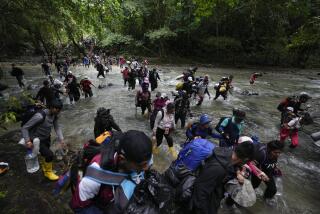Helping the Civilians to Guard the Guards : Latin America: Panama provides an opportunity to change our emphasis in the region, bolstering democratic rule instead of training armies.
The crisis in Panama has served to remind us yet again of the cursed influence of the military on civilian politics in Latin America. The political future of Latin American nations lies in a systematic redressing of the balance between military power and civilian authority--a process in which the United States can and must play a pivotal role.
President Bush has made welcome proposals to provide Panama with nearly $1 billion to support democracy by restoring the tattered economy. As we allocate these enormous resources, however, we must pay attention to the critical element of building civilian political control over the security forces.
In far too many Latin countries--in Guatemala, Honduras, El Salvador, Brazil and Uruguay--elected democrats remain hemmed in by the power of unelected military overseers who usurp civilian functions. The recent killings of six priests in El Salvador make it clear that the crisis there involves not only the ideological struggle between the forces of right and left but also the struggle of the civilian leadership to assert authority over a dangerously independent army.
Latin American armies have consistently played pernicious political roles. The United States has often played a contributing role in creating, training and arming soldiers. Our policy-makers have argued that through American efforts these armies might become more professional, more democratic, more influenced by us. None of this has come about. The governing style of military regimes includes human-rights crimes, all-encompassing and easily abused definitions of national security, and dislike of democracy. In Panama, the U.S.-trained Defense Forces turned out to be unprofessional enough to be easily corrupted by a corrupt leader.
Once and for all, we must dedicate our considerable resources to helping Latin America’s democrats wipe out the deadly myth spun by their militaries: that it is the soldiers who, in the words of the Argentine military, safeguard their nation’s “essence.”
In the 1980s, the United States supported dictators, invoking geopolitical need and the fear of communist-inspired political instability. Today, given the changes in Soviet foreign policy, our policies can no longer be based solely on the traditional concern for hemispheric military security. Only if we commit ourselves to empowering Latin civilians in the oversight of military affairs can we sustain the hope for enduring, pluralist rule.
Many practical ways exist to reapportion political and military functions. As the Panamanians begin their unique experiment in turning soldiers into “good cops,” we can provide technical support for splitting off the non-police functions of the former defense forces, such as immigration and customs, over which the military had assumed authority. Police academies can teach respect for human rights, democratic political ethics and legal process, while showing that police officers have honor in democratic societies. Political parties can increase their awareness of law-and-order issues, even as the civilian government assumes financial control over the soldiers.
In Panama, politicians, from the grass roots to the legislative level, must also be helped to devise an effective democracy in a political arena scarred by decades of military rule. Their parties may value training in the nuts and bolts of liberal institution-building and governance. In such efforts lies their security. By now we know that weak civilian institutions, squabbling politicians and polarized politics only invite soldiers to take power, with two tanks or 2,000.
If the Panamanians are successful in demilitarizing their forces, they will provide an invaluable model for the region. Such a restructuring of civil-military relations in Latin America will obviously not be easy. Still, if we truly believe, along with so many millions of Latin Americans, that democracy can make a stand, then we must rapidly complement our financial investments with sturdy programs of practical assistance in the sphere of civil-military relations. Upholding democratic values in civilians is surely more plausible and profitable than trying to instill them in soldiers. We must help Latin civilians guard the guards.
More to Read
Sign up for Essential California
The most important California stories and recommendations in your inbox every morning.
You may occasionally receive promotional content from the Los Angeles Times.










